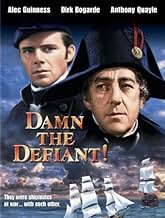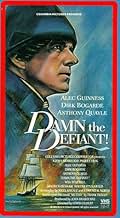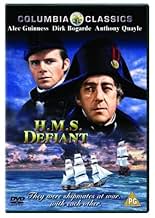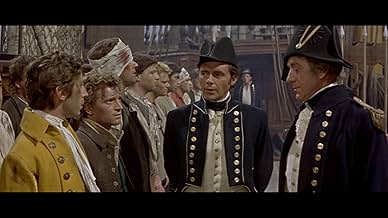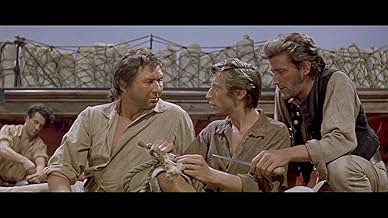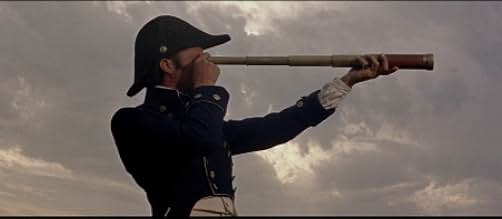Aggiungi una trama nella tua linguaOn the H.M.S. Defiant, during the French Revolutionary War, fair Captain Crawford is locked in a battle of wills against his cruel second-in-command Lieutenant Scott-Padget, whose heavy-hand... Leggi tuttoOn the H.M.S. Defiant, during the French Revolutionary War, fair Captain Crawford is locked in a battle of wills against his cruel second-in-command Lieutenant Scott-Padget, whose heavy-handed command style pushes the crew to mutiny.On the H.M.S. Defiant, during the French Revolutionary War, fair Captain Crawford is locked in a battle of wills against his cruel second-in-command Lieutenant Scott-Padget, whose heavy-handed command style pushes the crew to mutiny.
- Regia
- Sceneggiatura
- Star
Recensioni in evidenza
Denis Maternovsky
The ship is led by Captain Crawford (Alec Guinness), a fair man who is afraid to rattle the cage of his next in command, the sadistic Lieutenant Scott-Padget (Dirk Bogarde), who is well-connected and has ruined the careers of previous captains.
The ambitious Scott-Padget, however, is determined to take over the ship and wants things his way. To this end, he brutalizes Crawford's young son, who is on board as a midshipman, knowing that the principled Crawford will not interfere.
However, there are mutineers on board, led by Vizard (Anthony Quayle) who have written a petition for better food and more money. They hate Scott-Padget, and if they take control, he's in big trouble.
This is a very good film with suspense as well as excitement, dominated by the acting of Guinness and Bogarde. Guinness is brilliant - you can see him making an effort to control his anger, and one also sees his great pain. When he at last asserts himself, he is very noble.
Director Gilbert had to fight for Bogarde, so devalued was he by Hollywood, but Guinness spoke up for the actor as well, and he was cast. He does a great job - handsome, outwardly polite, and mean as dirt. Anthony Quayle is excellent as Vizard, who, in leading his men, demands patience.
Absorbing and entertaining, even if movies on the high seas aren't your thing.
The mutiny on the Bounty is the one that most people think of whenever they hear the word "mutiny". Otherwise they think of THE CAINE MUTINY. Actually there have been many mutinies. In 1905 a mutiny on the Russian battleship Potemkin occurred at Odessa on the Black Sea. It was immortalized by Serge Eisenstein in his film of the name POTEMKIN.
It surprises many people outside of England that the Bounty was peanuts compared to the Great Mutiny of 1797 at the Nore and Spithead of the entire British fleet (also the 1931 Invergordon Mutiny of the British fleet during the depression, which was a total surprise). The Great Mutiny is supreme because it occurred just when England was facing revolutionary France in the French Revolutionary Wars. A force being planned by Wolfe Tone and the French General Lazare Hoche was to invade Ireland. By sheer chance the French were unable to take advantage of the moment of England's peril to invade.
The 1797 Mutiny at Spithead was actually successful - various gains in pay and food were made by the sailors. Then came the Nore Mutiny, which was led by a seaman of some leadership qualities named Richard Parker. Parker's demands were impossible, and he apparently toyed with leading the fleet to France. Instead the British Admiralty got tough, and crushed the mutiny. Ironically one of the last ships to give up was H.M.S. Director, which was commanded by William Bligh. It was the second mutiny (of three!) that Bligh would face in his career. Parker was tried for mutiny and executed, as were dozens of other sailors.
It would be nice if some enterprising producer would make an accurate film of the 1797 Mutiny - but until that day comes we are left with two films that roughly approximate the story. There is Peter Ustinov's BILLY BUDD, which is set in the period of the Great Mutiny, and this one. BILLY BUDD has much going for it regarding it's source material (Herman Melville's brilliant study of good and evil, and how they are impossible to separate). Then there is DAMN THE DEFIANT / H.M.S. DEFIANT, which tells the story from the point of view of a single vessel and the evils that permeated all the crew from the Captain to the tars.
Alec Guinness is a well meaning but weak leader who is the Captain of Defiant, and has been stuck with Dirk Bogarde as his new second in command, a socially well-connected sadist. Bogarde is determined to be the real commander of the ship, and is willing to do what is needed to bring Guinness and everyone in sight under heal. Guinness's son is a midshipman on the DEFIANT, and Bogarde keeps finding ways of punishing the young man that Guinness (because of fears of favoritism) will not interfere with. On top of this, during one battle, Guinness loses an arm (a salute to Lord Nelson who was similarly was crippled).
However, the men led by Anthony Quayle, decide to join the mutiny. And then it is Bogarde's turn to sweat.
What were the gripes of the mutineers? Low pay (the government spent money on bribes for votes, but not decent pay). Nothing like pensions for the men - frequently kidnapped by press gangs in the major cities - and left cripples after serving in the naval battles. Food was crap - the quartermasters and the people who sold supplies were in cahoots and sold rotten food to the ships. It was a "lovely life". The wonder is that there weren't more bloodbath mutinies. One (in 1798) on board H.M.S. Hermoine led to the murder of a dozen officers, including the Captain (one Hugh Pigott). Reading of it makes one realize how lucky Bligh and the Admirals were that they did not face the real wrath that was just under the surface.
The plot line is good and for people like me who love wooden ships, the scenes of the ships and the naval battles are supurb. If one likes Hornblower or Maturin this is a movie you need to own. The transfer to DVD came out well (I also owned this one on a beta tape) and it is one of those core movies for the history buff.
I think Alec Guinness is the only actor who can portray a character who is colorless yet also make him sympathetic. Perhaps the World War II era (with its emphasis on teamwork, its glorification of the average G.I., and its near-worship of able, but dull, leaders like Omar Bradley) may have influenced it, because the movie strongly emphasizes the worth of the common man, especially as personified by Anthony Quayle's character.
It's an offbeat movie: part sea adventure, part character drama, part historical epic. Critics might say it's not satisfactory in any of these areas, but those of us who love it recognize how special and even unique it is. Now that Columbia has finally released on DVD a letter-boxed version one can fully appreciate its worth, not only for the sea battle scenes, but also the many two-shots of Guinness and Bogarde interacting (or, more often, snarling) at each other.
Lo sapevi?
- QuizSir Alec Guinness and Sir Anthony Quayle made this movie during the two-month break in the shooting of Lawrence d'Arabia (1962), when the production moved from Jordan to Spain. Upon finishing this movie, both returned to Lawrence of Arabia (1962).
- BlooperIn the last scene, Sir Alec Guinness orders all larboard (port side) guns to bear on the fire ship. In the next shot, the starboard cannon fire. Ironically, the term "larboard" was changed by the navy into the current term "port" precisely because it was too easy to mistake it for starboard.
- Citazioni
Lieut. Scott-Padget: [Scott-Padget turns back to the Captain as he begins to exit] You may have the power of life and death over every man about this ship, sir, but I warn you: if we come through this voyage safely...
Captain Crawford: [Crawford looks up from his work] Yes? If?
Lieut. Scott-Padget: To have followed Admiralty instructions may not be quite be enough.
Captain Crawford: [Crawford smacks his desk, jumps up and approaches Scott-Padget] I will say this to you only once, sir: I will not be bullied or threatened and I intend to be obeyed! Your friends in London mean nothing to me! I assure you that while you serve aboard this ship, they will mean absolutely nothing to you! You can go now.
- Curiosità sui creditiOpening credits prologue: SPITHEAD, ENGLAND 1797
- ConnessioniFeatured in La storia di Lady Hamilton (1973)
I più visti
- How long is Damn the Defiant!?Powered by Alexa
Dettagli
- Data di uscita
- Paese di origine
- Lingue
- Celebre anche come
- Damn the Defiant!
- Luoghi delle riprese
- Denia, Alicante, Comunidad Valenciana, Spagna(Spanish coast)
- Aziende produttrici
- Vedi altri crediti dell’azienda su IMDbPro
- Tempo di esecuzione
- 1h 41min(101 min)
- Colore
- Proporzioni
- 2.35 : 1


